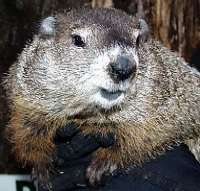|
|
 |
|
|
|
 |
| |
|
|
 |
Weather
Basics |
Long range forecasting
Most of the natural forecasting methods only work over a very short time period. Long range proverbs also exist, but most of them have no meteorological basis. Some of them are more accurate than others but all of them are controversial.
To find universally acceptable long range weather proverbs is very difficult. They tend to vary from country to country and strongly depend on the climatic conditions in the region.
|
|
|
|
|
 |
 |
 |
|
1. Hedgehog
|
|
 |
February 2nd
One of the few widely used long range weather proverbs relates to February 2nd, Candlemas Day.
According to an old English song:
|
 |
 |
|
2. Brown bear
|
|
 |
"If Candlemas be fair and bright,
Come, Winter, have another flight;
If Candlemas brings clouds and rain,
Go Winter, and come not again.”
The Romans brought this proverb to the Germans during their conquest of the northern countries. The Germans adopted it and concluded that if the Sun made an appearance on Candlemas Day, a hedgehog would cast a shadow. If this happened, six more weeks of bad weather would result, and they called this time the "Second Winter."
In several countries people believed that animals came out on the 2nd of February to judge the quality of the weather.
|
 |
 |
|
3. Groundhog
|
|
 |
In Hungary, for example, the shadow of a brown bear is observed. In the United States Groundhog Day is a very popular tradition.
"If the groundhog sees his shadow
we will have six more weeks of winter.”
The groundhog's seasonal forecasting accuracy is low and its predictions of winter are only correct 39% of the time!
|
Summer Rain Signs
Another generally believed weather rhyme is connected to summer rains.
"If on the eighth of June it rain
That foretells a wet harvest, men sayen”
In France the weather on the feast of Saint Medard (June 8th) is said to determine whether the next few weeks will be wet or dry. If it rains, the rain will continue for four or five weeks, or recur at haying time. Rain on the 8th June in Norway and Hungary will lead to forty days of rain. In Flanders the day is July 6th, the feast of Saint Godelive. In Germany it is the 27th June, which is known as Seven Sleepers Day.
|
 |
|
|
"If it rains on Seven Sleepers Day, the rain will stay seven weeks more.”
If it rains in England on St. Swithin's Day, the 15th of July, the proverb says that it will rain for forty days and if it is dry then there will be fine weather for the next forty days. The proverb goes back to the Elizabethan times.
"St Swithin’s Day, if it does rain
Full forty days, it will remain
St Swithin’s Day, if it be fair
For forty days, t'will rain no more."
These summer-rain weather proverbs are quite accurate and work more or less in about 70% of cases.
Compiled by Vera Schlanger - Hungarian Meteorological Service
Scientific reviewing: Dr. Ildikó Dobi Wantuch / Dr. Elena Kalmár - Hungarian Meteorological Service, Budapest
Last updated 2003-12-13
For more details, and many other long range folklore predicting, visit the following sites:
http://www.ibiblio.org/uncpress/newsbytes/august98/rain.html
http://www.schooloftheseasons.com/julydays1.html#swithin
http://www.weathernotebook.org/transcripts/2003/07/14.php
http://www.woodlands-junior.kent.sch.uk/customs/stswithun.html
http://www.wilsonsalmanac.com/umbrella.html
http://www.stormfax.com/ghogday.htm
http://www.groundhog.org/history/tradition.shtml
http://wv.essortment.com/weatherfolklore_ruao.htm
http://www.stalkingthewild.com/weather.htm
http://members.aol.com/Accustiver/wxworld_folk.html
|
|
 |
|







